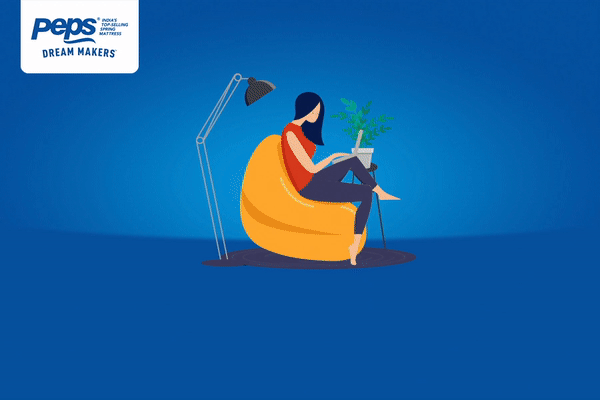
Sleep is defined as a condition of body and mind which typically recurs for several hours every night, in which the nervous system is inactive, the eyes closed, the postural muscles relaxed, and consciousness practically suspended. The process of sleep is one of the most critical natural processes responsible for a number of biological activities that sustain everyday well-being. It’s obvious then that good sleep directly results in better productivity as one is rejuvenated.
But, how much sleep do you need to be equipped for having a productive day? A person needs 7-8 hours of sleep to function optimally and there are quite a few hacks to achieve this.
But what if you fail to get the required amount of sleep? Don’t worry, here are 7 hacks that can help..
1.Set boundaries for screen time
The most important advice would be to avoid everything electronic and that which disturbs your sleeping environment. Electronic screens emit blue light, a spectrum of light that stimulates your mind and hinders the production of melatonin, which keeps you awake.
While reading a paper book is debatable, but to get quality sleep, read in the living room and then move to the bed. Make sure you don’t read anything complex or related to work.
2.Set A Routine
It’s nearly impossible to have a straightjacket set routine for your daily life. But, even with an unsteady schedule, it’s important to have a reasonable idea of how the day is going to pan out.
Quite a few studies have found that rapid eye movement cycles renew and refresh the brain, and hence, is decisive in maximizing productivity.
The trick is to be open-ended with the sleep schedule while sticking to a set constraint. Any drastic shift makes you lose productivity as the body is unable to signal when it’s tired. It’s advisable to avoid oversleeping on weekends, as it can throw your entire biological clock into a mess.
3.Find soothing music:
There are quite a few studies that have tried to understand the effect of slow and pleasant music on the brain. Quite a few have found that such music helps the brain function at an optimal level while helping the individual with focus. So the next time you want to be productive after a late night, listen to soothing music while sipping green. While the calming music cannot replace sleep, it can help the mind focus on the task at hand. This, in turn, can help you finish work in time to sleep early and bring your circadian rhythm back on track.
4.Optimise most productive parts of the day
People are at their peak at different times of the day. Some are most creative at night, while others are more productive very early in the morning. So take some time to identify periods during the day when you are at your peak. Setting your schedule according to your energy levels during the day will not only increase your focus, creativity, and productivity but can also help you understand yourself better.
5.Ditch the snooze button
A heavy sleeper often finds a good friend in the snooze button. But make it a habit, and one is stepping onto a slippery slope. The habit could jeopardise energy levels meant to last the entire day. Addressing sleep inertia is simple. If the alarm wakes one up from deep sleep, it’s best to face the day. Hitting the snooze will only leave you feeling worse because the body clock doesn’t know if it’s in deep sleep, light sleep or it’s time to get up. Numerous studies have shown that hitting the snooze button can cause you to feel tired throughout the day. Relying on the snooze habit can also result in serious ailments over a period of time.
6.Power-up with caffeine and napping
Counterintuitive at first look, but combining a cup of coffee with a nap can prove one of the most effective ways to boost one’s energy during the day. A study discovered this while determining the most effective means of relieving daytime fatigue.
As caffeine generally takes around 20 minutes for its effects to kick in, you’ll need to quickly down a cup of coffee, then immediately seek a quiet place for a short snooze. It can be your bed, a quiet meeting room if you’re at work or perhaps even your car.
7. Breathing to sleep in 60 seconds
Sometimes, even after a long tiring day, it may be difficult to fall asleep. But don’t worry. You needn’t be a yoga master or a monk to benefit from guided breathing techniques. A simple practice every night, like alternate nostril breathing counters the body’s stress signals and can be practised anywhere to slowly transition into a peaceful sleeping experience. This will help you wake up recharged and ready to chase your dreams the next day.
Now you are equipped with a few simple yet effective hacks to ensure you experience good sleep while being productive. So go ahead, and try some of these methods to see a positive change in your everyday life.

